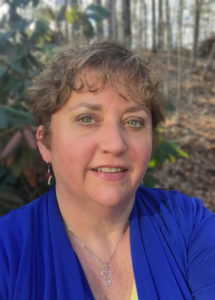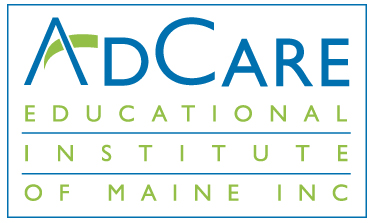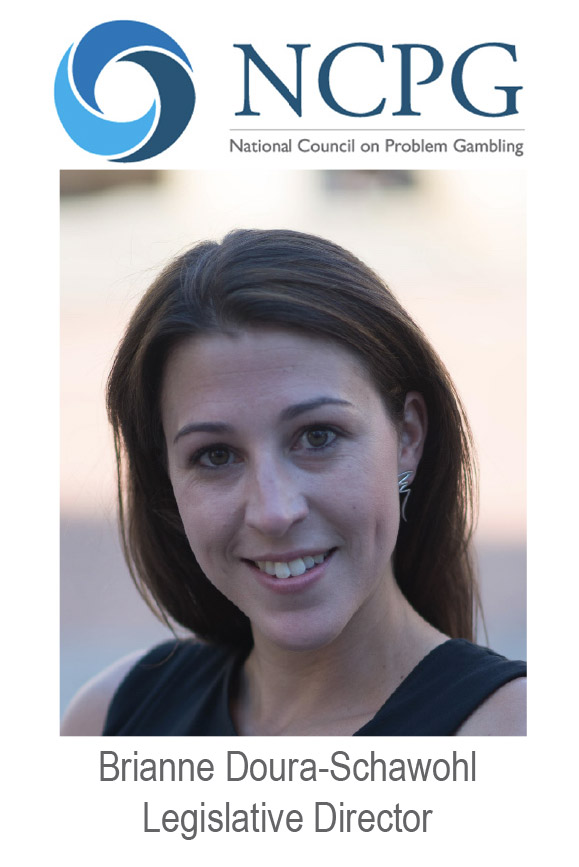From her home office in Arlington, Virginia, Brianne Doura-Schawohl spoke via videoconference with a group of people who were sitting on their porches, in home offices or at their kitchen tables at their homes in Maine.
Brianne is the Legislative Director at the National Council on Problem Gambling (NCPG). The people from Maine were counselors, healthcare providers, educators, government employees and others who were interested in the topic of problem gambling services in Maine.
They all came together on the afternoon of Friday, June 12 to hear Brianne present Problem Gambling in Maine: The State of the State: Updates and Trends from Maine and the Nation.
This training was months in the making and the circumstances were vastly different than originally planned. Early in January, Brianne agreed to fly to Maine in March to present at the 2020 Annual Conference on Problem Gambling Awareness. Though circumstances related to COVID-19 resulted in the cancellation of the live conference, Brianne and the other major presenters agreed to present their content via webinar.
In her role, Brianne travels the nation to assist the states in their efforts to minimize risk and reduce the harm caused by problem gambling. This work puts her in a unique position to discuss the nation’s gambling infrastructure and emerging trends. She recognizes the barriers and what some states are doing to overcome them. In comparison, she was able to point out areas where Maine’s problem gambling services are strong and also where there are opportunities for major improvement.
“We know that every individual who is struggling, their gambling disorder affects 8-10 other individuals in their lives,” she said, stressing how important problem gambling awareness and prevention are.
She shared data from the 2016 Survey of Problem Gambling Services in the United States, which estimates that 2.2% of Maine adults (23,639) are believed to have a gambling problem.
She shared that 2019 data from the NCPG National Gambling Hotline, revealed that 349 calls, 2 texts and 5 chats were received from Maine residents.
“Not an insignificant number coming from Maine. We know there are people looking for help,” she said. “We know there are people struggling.”
Brianne stressed that since a very low percentage of problem gamblers seek help, and since it usually takes them years to do so, it is very important for that call to go well, as it has taken such courage to reach out.
She pointed out that there is no federal funding for problem gambling services and there are a number of states with no state funding at all. Maine’s per capita investment in problem gambling is 8¢ compared to the average investment of 37¢ in states that do have problem gambling funding.
Annually, a fixed amount of $100,000 is allocated to problem gambling services in Maine to cover awareness, prevention, intervention, treatment and recovery.
“The estimated social costs to families and communities for gambling-related bankruptcy, divorce, crime and job loss is estimated to be $20 million in Maine. For every $1 invested in prevention, there is a $2 savings,” she said.
Brianne talked about trends in sports betting and stressed that Maine needs to advocate for expansion of problem gambling funding to go hand-in-hand with any sports betting legislation. In a recent interview with ESPN, she said, “Research indicates that anytime we introduce a new form of gambling we will simultaneously bring additional problems and concerns, thus requiring additional dollars. It is our stance that all stakeholders bear the responsibility to contribute to the research, prevention, treatment, and recovery of gambling addiction. If you profit from legalized gambling, you share the responsibility to pay for the negative consequences that can come from it.”
Brianne discussed a number of trends and barriers from around the nation, but Maine has a unique barrier that has a significant impact on the treatment of gambling disorder in Maine. Maine’s drug and alcohol counselors (LADC) are not able to treat people for gambling disorder due to scope of practice issues. Specifically, it was noted there was language in Maine statute that specifically precludes LADC’s from providing gambling addiction treatment services. This adds to the difficulty in recruiting and training an adequate number of treatment providers to meet the needs of people with gambling problems. Maine is a large state geographically and currently, only a small number of providers treat gambling disorder.
Brianne said, “Other states don’t have this carve-out or exception. It doesn’t make sense. They are actually causing an increase in those social costs I talked about …that $20 million. Imagine what the treatment community could look like if we removed that barrier.”
In closing, Brianne said, “I do hope that someday I can be in Maine and have lengthier discussions about what we can do to strengthen problem gambling services for you all.”
Maine’s Annual Conference on Problem Gambling Awareness, as well as the spring webinar series are hosted by the Maine Council on Problem Gambling and AdCare Educational Institute with funding from the Maine Center for Disease Control and Prevention.
If you or someone you know has a gambling problem, in Maine, call 2-1-1 or text your zip code to 898-211.
View the Presentation Slides (PDF Format) or download.
ABOUT THE AUTHOR:

Lori Manson
Problem Gambling Service Coordinator at AdCare Educational Institute of Maine, Inc.

